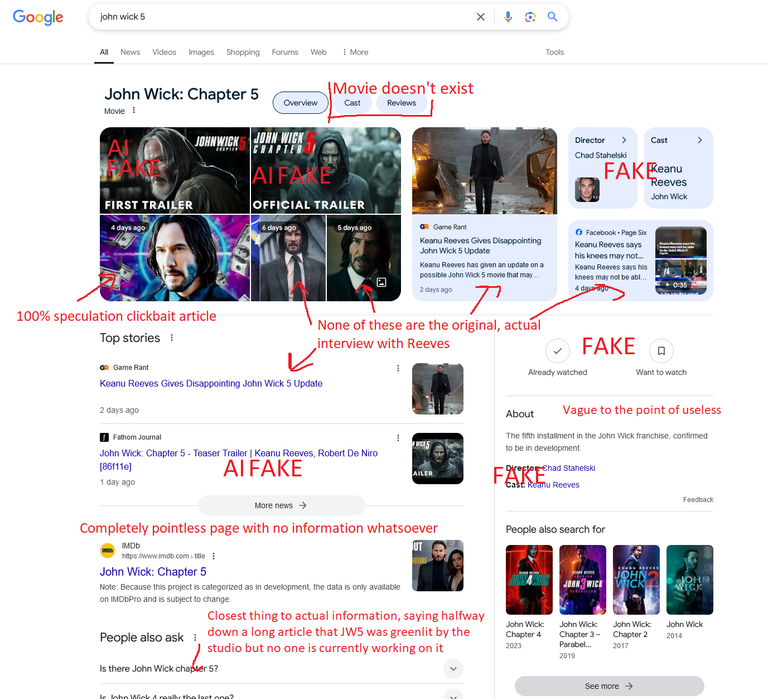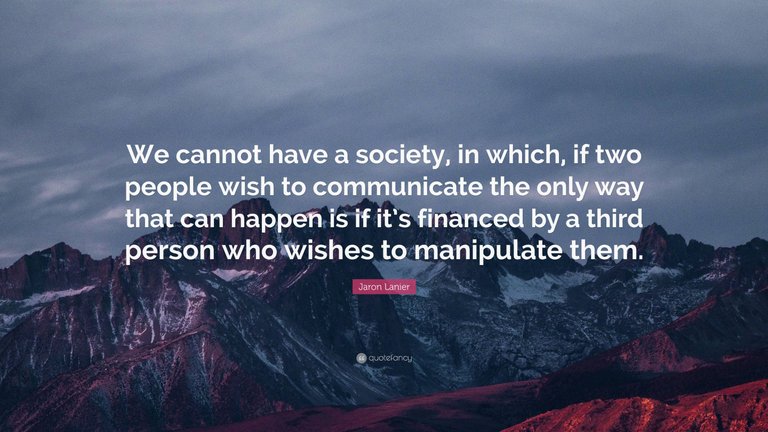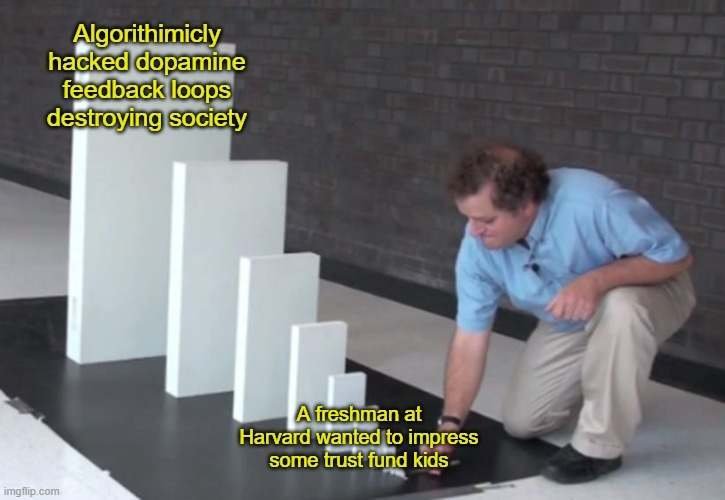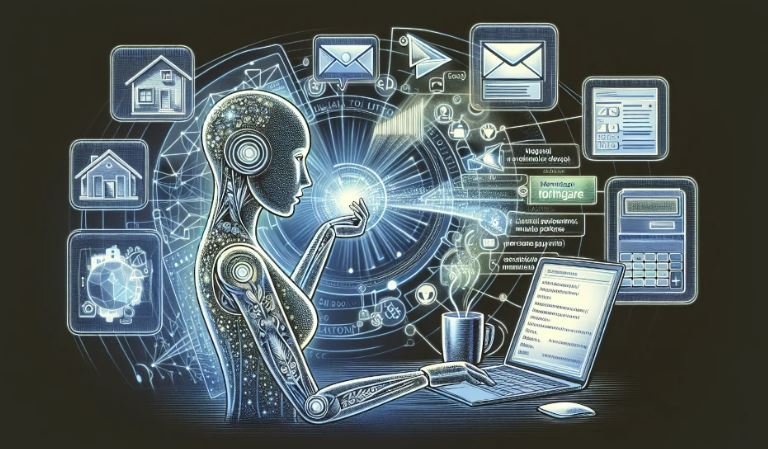Od czasu do czasu w pewnych częściach Internetów natknąć można natknąć się na artykuły listujące teorie spiskowe, które zostały potwierdzone i udokumentowane. Teoria martwego Internetu jest to jednak przypadek zgoła inny. Wydaje się, że teoria ta została po prostu wygłoszona przedwcześnie. Nie wchodząc w szczegóły, teoria zakłada, że większość ruchu w Internecie jest generowana przez boty, a kontent tworzony jest maszynowo.
Wiele osób zastanawia się czym galopujący rozwój technologii zaskoczy nas w 2025, mówi się o robotyce, komputerach kwantowych. W mainstreamowej narracji o wpływie technologii dominuje spolaryzowana debata między skrajnymi optymistami i skrajnymi pesymistami. Tymczasem z pola widzenia znika nam trochę to, co mamy tuż przed nosem. Zupełnie niespodziewanym efektem rozwoju sztucznej inteligencji może być sprawienie, że Internet jaki znamy stanie się absolutnie bezużyteczny. Stawiam tutaj odważną tezę, że rok 2025 będzie rokiem, w stanie się to niezaprzeczalne. Czy wyszukiwarki nadal można uznawać za wiarygodne źródła informacji? Wszechwładny "algorytm" i prawa rządzące SEO sprawiają, że obecny system zapada się pod własnym ciężarem. Jasne, że Google wciąż może mieć rację w 90% przypadków, tylko weryfikacja informacji będzie coraz bardziej uciążliwa. A nawet jeszcze nie wspomniałem o AI.

Być może LLM-y będą w stanie zastąpić wyszukiwarkę, na razie jednak wciąż poważnie halucynują, mimo, że jakość generowanych treści poprawiła się znacząco. Są jednak wciąż wydawałoby się proste problemy, z którymi AI rady sobie nie daje. Jak tu polegać na takim źródle informacji? Rozwój sztucznej inteligencji może mieć też inne konsekwencje. Tak jak rok 2023 był rokiem czatu i LLM-ów, tak ubiegły rok był rokiem agentów. Czym jest agent sztucznej inteligencji?
Określenie agent odnosi się do systemu lub programu, który zdolny jest do samodzielnego wykonywania akcji. Agenci mogą wykonywać proste zadania na Twoim komputerze, ale też działać w sieci. Stosunkowo niedawno przebiła się informacja o pierwszym milionerze AI. Agent stworzył własnego meme coina, którego wycena wkrótce przekroczyła wartość Hive'a. Już teraz dostępne są narzędzia pozwalające "wpuszczać" takich agentów w media społecznościowe.
Od czasu do czasu trafi mi się filmik z internetowym pRzeDSięBiorCą w roli głównej, który z jakiejś egzotycznej wyspy poleca super sposoby na dochód pasywny w Internecie. Oglądam z uważnością (być może dlatego widzę tego ostatnio więcej) bo przecież to kopalnia wiedzy o współczesnych możliwościach. Już ponad rok temu pisałem o chińskich influenserach, którzy zautomatyzowali produkcję materiałów sprzedażowych. Jak rozwija się ten upiorny rynek? Zobaczmy.
Generowanie treści to już raczej sprawa oczywista. Tekst, zdjęcia, generowanie treści audio z głosem autora (również w językach obcych) scenariusze do wideo, same treści wideo też wyglądają już coraz lepiej. Przeszukiwanie Internetu w poszukiwaniu wiralowych treści, do których można by się odnieść, automatyczne generowanie tematów do tworzenia treści w danej tematyce, automatyczne dodawanie treści do wszystkich platform po dodaniu na jednej z nich, automatyczny agent marketingowy, spersonalizowane automatyczne wiadomości, generujący i udostępniający treści reklamujące kanał/produkt. Wybaczcie linków nie będzie.

Biorąc pod uwagę, że media społecznościowe (poza prywatnymi grupami) już stały się słupami reklamowymi działającymi w warunkach dzikiego kapitalizmu i zakładając, że jakość treści generowanych będzie rosła to twórcy autorskiego kontentu z czasem będą powoli wypierani. Treści w coraz większym stopniu odnosić będą się do siebie samych, a w coraz mniejszym do rzeczywistości. Jaka jest wartość takich stron? Zgodna z designem - wypluwanie porcji dopaminy w krótkich spięciach układu nerwowego użytkownika. Dla innych wartością będzie szybki i tani dostęp do szerokiego grona potencjalnych klientów, w tym akurat nie ma nic złego, ale nazywajmy rzeczy po imieniu, żadne to media społecznościowe. Wśród tych ostatnich, ci którzy będą gotowi przeznaczyć najwięcej środków na boty będą sterować dominującymi narracjami. Taki Internet będzie martwy.

Co na to właściciele społecznościowych gigantów? Meta dopiero po ostrej krytyce użytkowników wycofała się z pomysłu wpuszczenia własnych agentów do sieci. Być może Zuckerberg i Musk zaczną zwalczać aktywność AI, nie stanie się to od razu, ale dopiero kiedy zaczną zauważać spadki dochodów. Rozpocznie się wtedy wyścig zbrojeń, w którym platformy skazane są na porażkę. Problemem tym kieruje ciekawa dynamika.

Cenzor musi przyjąć sobie jakiś procent pewności dotyczący występku. Im niżej ustawiony próg pewności tym większa skuteczność, ale też więcej fałszywych pozytywów, kolejni użytkownicy będą niesprawiedliwie banowani z bardzo słabymi możliwościami do apelacji. Z kolei jeśli chcieć mieć większą pewność to przez sito przejdzie wiele niewykrytych sytuacji, a więc skuteczność będzie niska. Cukier przedstawił tę problematykę w ostatniej rozmowie z Roganem, mówił o tym w kontekście cenzurowania FB. Nie widzę powodu, dla którego przy walce z agentami AI nie miałoby to wyglądać bardzo podobnie.

Nie, słynny znak Hollywood, wcale nie płonął. Już teraz bardzo często widać komentarze kwestionujące autentyczność materiałów, a nawet samą możliwość weryfikacji. Biorąc pod uwagę dostępne narzędzia, trendy i tempo rozwoju AI uważam, że właśnie ten rok będzie kluczowy w historii rozwoju Internetu.
Jaka jest więc przyszłość mediów społecznościowych? Myślę, że wiele osób na Hive może mieć co do tego pewne przeczucia ;) Od czasu do czasu giganci technologiczni wpadają na jakiś pomysł, który jest krokiem do przodu (community notes znane z X). Te rozwiązania przyrównać można do zamiatania podłóg na tonącym Titanicu, problemy systemowe wymagają systemowych rozwiązań.
Kluczowe jest wyjście z problemu rozbieżnych motywacji właścicieli platform, twórców i odbiorców treści. W historii ten problem rozwiązywany był przy pomocy systemów kar i nagród. Co gdyby zamiast tego rozbić ten trójkąt i oprzeć relacje w Internecie na trosce o przestrzeń wspólną i osobistej finansowej odpowiedzialności odzwierciedlanej wartością kryptowaluty? Twórcy treści i odbiorcy przestają być użytkownikami, a stają się współwłaścicielami. Społeczność sama w sobie ma moc do decydowania o tym, które treści są nagradzane, a które mniej widoczne. Dzięki systemowi reputacji generowanie treści i inne próby oszukania systemu stają się nieopłacalne. Jednocześnie wolność słowa i transakcji musi być zapewniona, moderowana tylko przez społeczność.
To wszystko wymaga zastosowania bardzo precyzyjnie skonstruowanej technologii, ale żaden CEO nie jest w stanie tego zapewnić, niezbędny jest organiczny, oddolny rozwój przez zdecentralizowaną społeczność.
Hive nie jest idealny, jest natomiast z pewnością najbliżej wizji zrównoważonego Internetu, w którym czuję się bezpiecznie i mam pewność, że mam do czynienia z prawdziwymi osobami po drugiej stronie. Oddech świeżego powietrza. Już wkrótce Internet oparty na takich wartościach może być bardzo potrzebny. Innego może już nie być.

ENG
From time to time, in certain corners of the Internet, you can come across articles listing conspiracy theories that have been confirmed and documented. Dead Internet theory is, however, a completely different case. It seems that this theory was simply proclaimed prematurely. Without going into details, the theory assumes that most traffic on the Internet is generated by bots and that content is machine-generated.
Many people wonder how the rapid development of technology will surprise us in 2025, with discussions often centering on robotics and quantum computers. In mainstream narratives about technology’s impact, a polarized debate dominates between extreme optimists and extreme pessimists. Meanwhile, we’re losing sight of what’s right under our noses. An entirely unexpected consequence of AI development might be making the Internet as we know it completely useless. Here, I make a bold claim that 2025 will be the year when this becomes undeniable. Already, can search engines really be considered reliable sources of information? The almighty "algorithm" and the rules governing SEO are collapsing under their own weight. Sure, Google can still be right in 90% of cases, but verifying information is becoming increasingly tedious. And I haven’t even mentioned AI yet.

Maybe LLMs will eventually replace search engines, but for now, they still hallucinate quite severely, even though the quality of generated content has improved significantly. However, there are still seemingly simple problems that AI cannot solve. How can you rely on such a source of information? The development of artificial intelligence might also have other consequences. Just as 2023 was the year of chatbots and LLMs, last year was the year of agents. What is an AI agent?
The term "agent" refers to a system or program capable of performing actions independently. Agents can perform simple tasks on your computer but also operate online. Relatively recently, news broke about the first AI millionaire. The agent created its own meme coin, whose value soon surpassed Hive's valuation. Already, tools are available that allow such agents to be "released" into social media.
From time to time, I come across videos featuring internet entrepreneurs who, from some exotic island, recommend super methods for earning passive income online. I watch them closely (perhaps that’s why I’ve been seeing more of these lately) because, after all, it’s a goldmine of knowledge about contemporary possibilities. Over a year ago, I wrote about Chinese influencers who automated the production of sales materials. How is this creepy market developing? Let’s see.
Content generation is already pretty much a given. Text, photos, audio content with the author’s voice (also in foreign languages), conversations, video scripts, and even the video content itself are all improving significantly. Scouring the internet for viral topics to reference, automatically generating topics for creating content in a given niche, automatically uploading content to all platforms after posting on one of them, personalized mass messeging systems, an automatic marketing agent generating and sharing materials to promote channels/products—it’s all out there. Sorry, no links.
Considering that social media (except private groups) has already become advertising billboards operating under wild capitalism, and assuming the quality of generated content will continue to grow, creators of original content will slowly be displaced. Content will increasingly refer to itself and less and less to reality. What is the value of such platforms? Consistent with their design—delivering doses of dopamine in short bursts to users’ nervous systems. For others, the value will lie in fast and cheap access to a broad audience of potential customers. There’s nothing wrong with that, but let’s call things by their proper names—these aren’t social media platforms. Among those remaining, those willing to spend the most on bots will control dominant narratives. Such an internet will be dead.

What about the owners of social media giants? Meta only backed down from the idea of introducing its own agents into its network after sharp criticism from users. Perhaps Zuckerberg and Musk will begin to fight AI activity; it won’t happen immediately but only when they start noticing revenue declines. A technological arms race will then begin, one where platforms are doomed to fail. This issue is driven by an interesting dynamic.

Censors must adopt a certain level of certainty regarding violations. The lower the threshold, the more effective it is but also results in more false positives, with users being unfairly banned and having weak options for appeals. Conversely, if greater certainty is required, many cases will slip through the cracks, reducing effectiveness. Zuck addressed this issue in a recent conversation with Rogan, discussing it in the context of Facebook censorship. I see no reason why combating AI agents wouldn’t look very similar.

No, the famous Hollywood sign was not burning. Already, it’s common to see comments questioning the authenticity of materials or even the possibility of verification itself. Considering the tools, trends, and pace of AI development, I believe this year will be pivotal in the history of internet development.
What is the future of social media? I think many on Hive might have some insights about this ;) From time to time, tech giants come up with an idea that is a step forward (like community notes known from X). These solutions can be likened to sweeping floors on the sinking Titanic; systemic problems require systemic solutions.
The key lies in resolving the problem of conflicting motivations between platform owners, content creators, and content consumers. Historically, this problem has been addressed through systems of rewards and penalties. What if, instead of this, we dismantled this triangle and based internet relationships on care for shared spaces and personal financial responsibility reflected by the value of cryptocurrency? Content creators and consumers cease to be users and instead become co-owners. The community itself has the power to decide which content is rewarded and which is less visible. Thanks to a reputation system, content generation and other attempts to cheat the system become unprofitable. At the same time, freedom of speech and transactions must be ensured, moderated only by the community.
All this requires the use of very precisely designed technology, but no CEO can guarantee this. What’s needed is organic, grassroots development by a decentralized community.
Hive isn’t perfect, but it’s certainly the closest to a vision of a sustainable internet where I feel safe and confident that I’m dealing with real people on the other side. A breath of fresh air. Soon, an internet based on such values might be very necessary. There might not be any other viable option.


